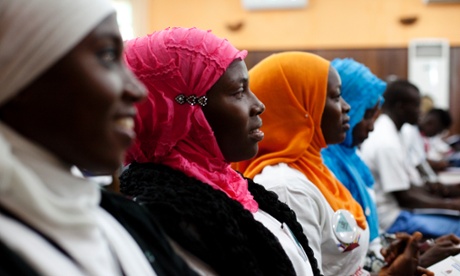
They call the Gambia the smiling coast, and as 100 young people from across the country poured into the Paradise Suites Hotel in Kololi beach on Wednesday, it was easy to see why.
They came from all corners of the nation – girls and boys, rural and urban, in school and out, uniting for the first ever youth summit on female genital mutilation. Chatting, smiling and laughing – but determined that FGM would end with their generation.
It’s the first time young people in this small west African nation have decided to take the fight against FGM into their own hands, but they also remembered to invite the grown-ups. Key officials of the Gambian government came to the event on Tuesday, in a move described as “groundbreaking” by campaigners against the practice.
Spearheaded by Gambian-born Jaha Dukureh, the face of a Guardian-backed campaign to combat FGM in the US, the youth summit has brought 100 Gambians between the ages of 17 and 25 together to teach campaigning and social media skills and equip them with the legal and medical knowledge to go out and spread the word among their own generation.
Dukureh, an Atlanta resident who has advised the Obama administration since launching her campaign, said she was hopping with excitement to bring it to her birth country.
“I think the energy in this place is amazing, it has been so much work to bring these people together but you can really see that young people are engaged and that is just so good.”
She applauded ministers from the youth and women government departments, who both pledged to help the Youth Summit in their struggle. “It is a big deal that they are here,” said Dukureh. “We can only end FGM if everyone works together. Now they have made those speeches, they are engaging and these are things we can build on.”
FGM is not illegal in the Gambia, where 76% of girls are still cut, many of them going through the most severe form of the practice that involves the removal of the clitoris and labia and the sewing-up of the vagina so only a small hole remains.
Nancy Niang, permanent secretary for the ministry of youth and sports was unequivocal in her address to the audience. “To steal from Shakespeare, I come here to bury FGM, not to praise it,” she said.
Asked if the government would take action, Binta Jammeh Sidibeh, executive director of the women’s bureau, said people had to be ready to renounce the harmful practice before a law could be put in place. “We have to educate the masses, this is deeply rooted in our culture. Before you make policies, people have to accept change,” she said. “The government is there for the people, it can’t do anything before the people are ready for it.”
But she welcomed the youth summit as a major step forward. “This is what we need – young people coming together, and taking up issues started by their elders – I guess we need some more energy.”
That energy was apparent in the youthful audience, resplendent in branded white T-shirts, who were given the task of coming up with viral challenges – such as the ice bucket challenge – and hashtags to share on social media that would spread the message.
Isatou Foom, an 18-year-old delegate from the Central River region, said she wanted to be part of the change she was sure was on its way. “Those old guys in the village are hard to convince. They tell you it’s a cultural value and get angry,” she said, adding that she planned to set up a local group after the summit. “We’re forming our own clubs, our own radio shows and I think it will be much easier to talk to our fellow students and people our own age about FGM. It’s very exciting to be here.”
The two-day summit, which is co-funded by the Guardian and the Girl Generation, is a very 21st century conference, coming out of a Facebook group of young Gambian organisations such as Think Young Women and the National Youth Council, who joined with Dukureh to put on the event.
At last-minute date change has left organisers working around the clock to get the event on in time. “I’m so happy, but so tired,” said the communications lead, Jama Jack, who added that the focus on youth was central to the event. “We don’t want to negate the efforts of others, but we have a different target audience – we want the same result, but we might be using different strategies. This isn’t a conference where everyone knows the outcomes before it even starts, where it’s just people agreeing with each other. As soon as the opening address is over, it’s just going to be young people sharing ideas and strategies for how we are actually going to do this.”
• This article was amended on 15 October 2014 because an earlier version said FGM is illegal in the Gambia. This has been corrected to say not illegal.

